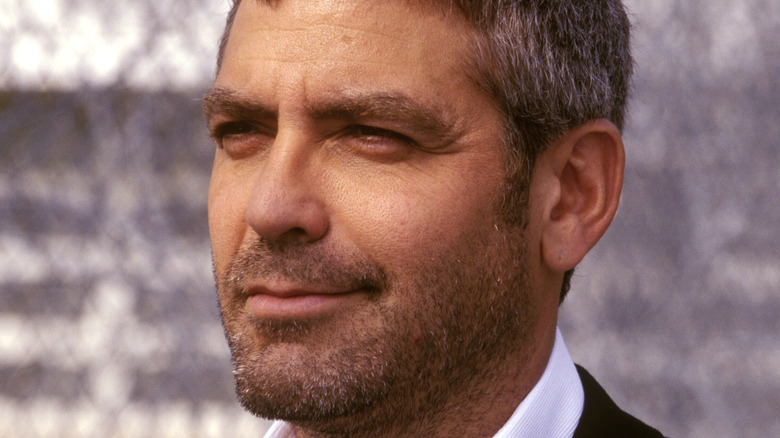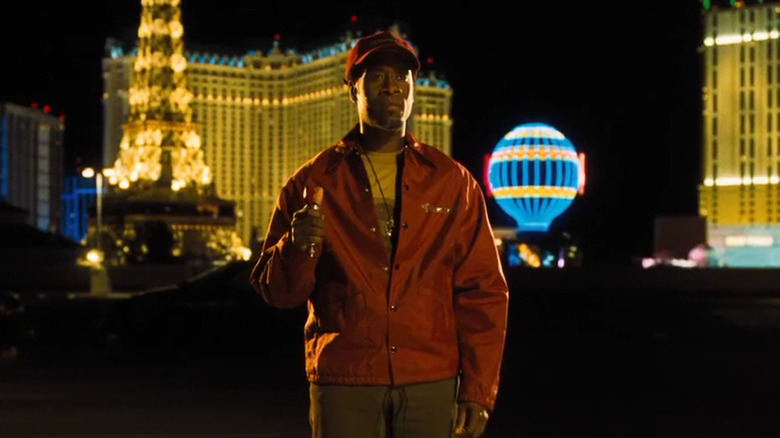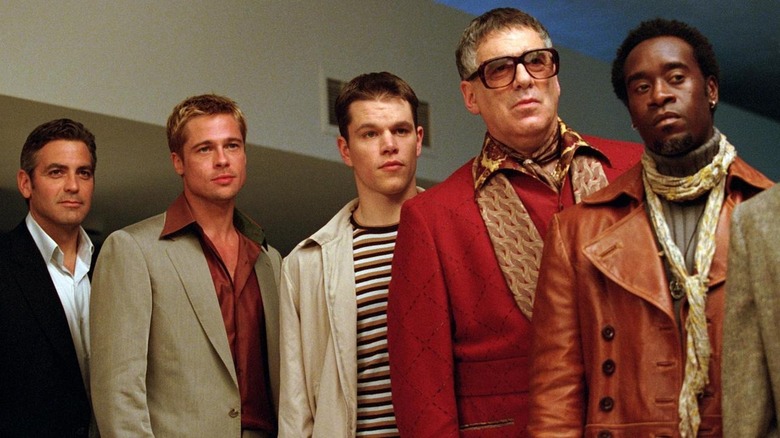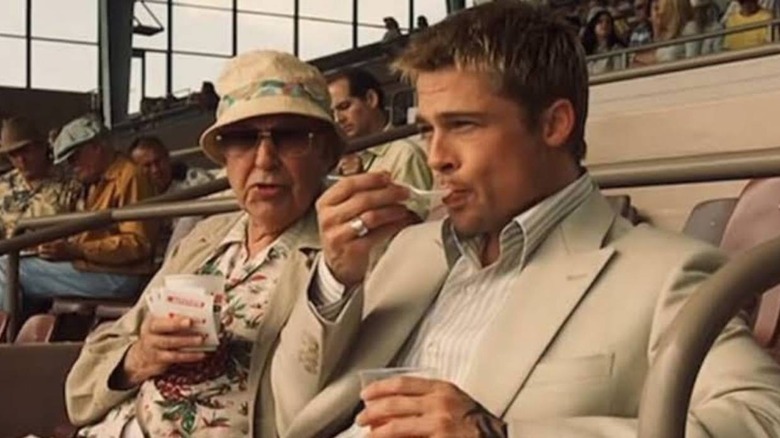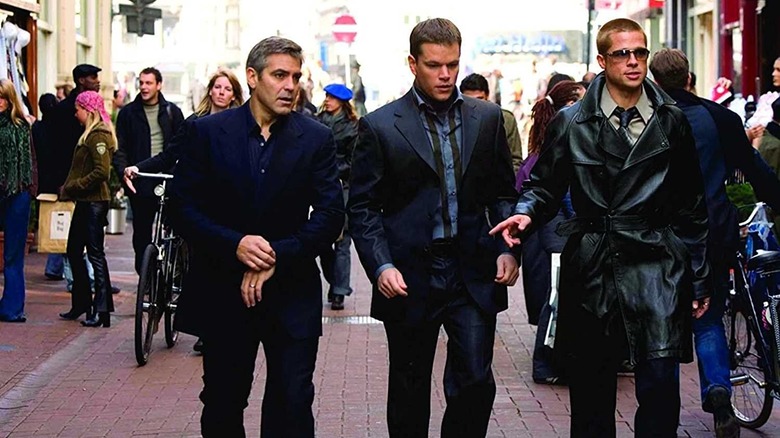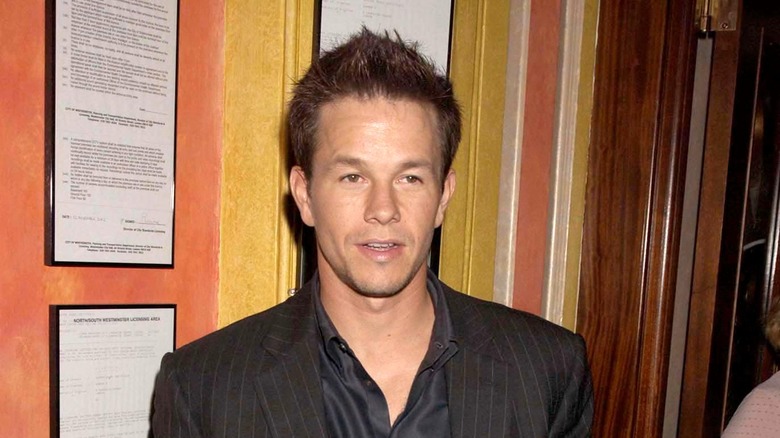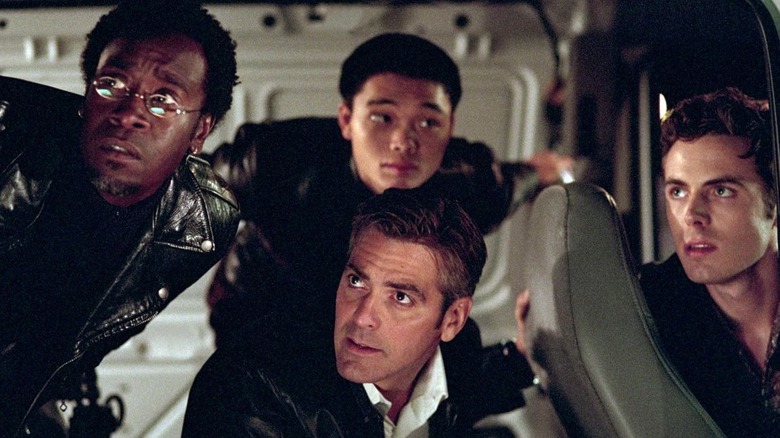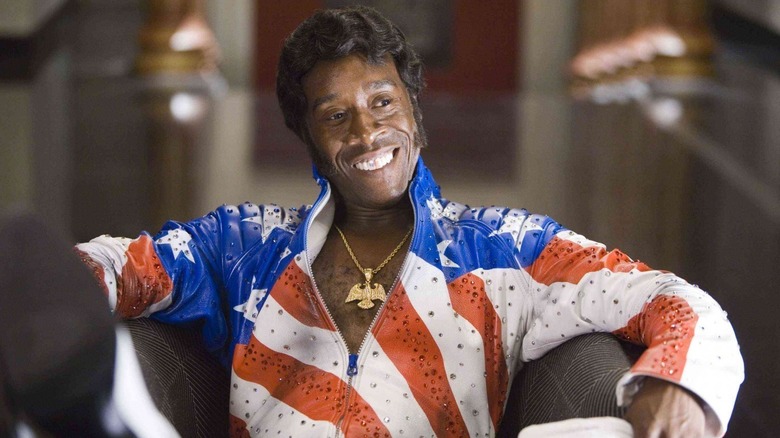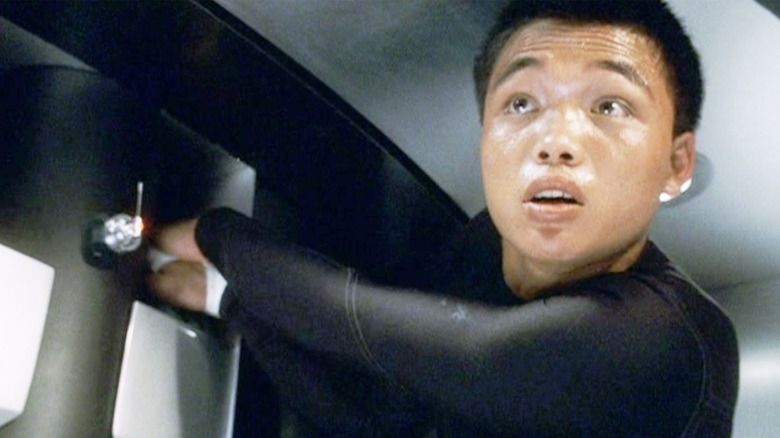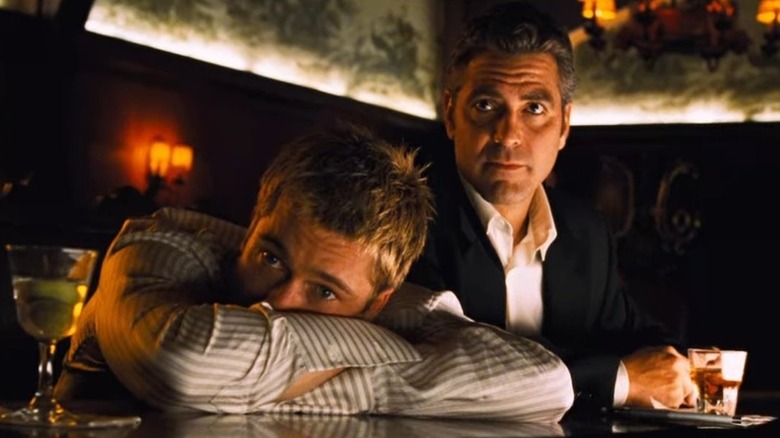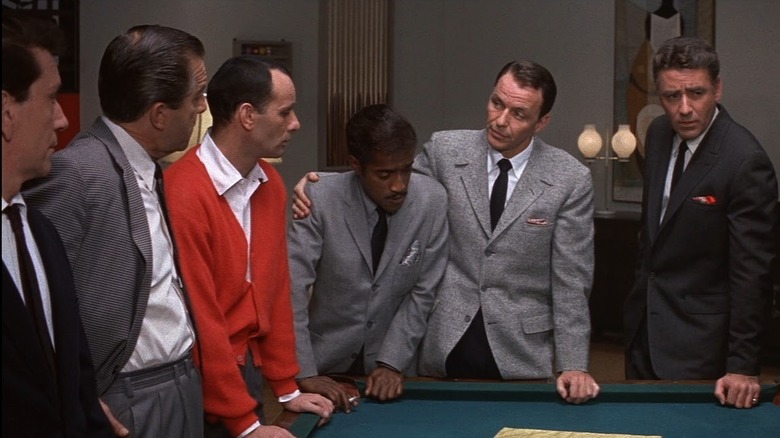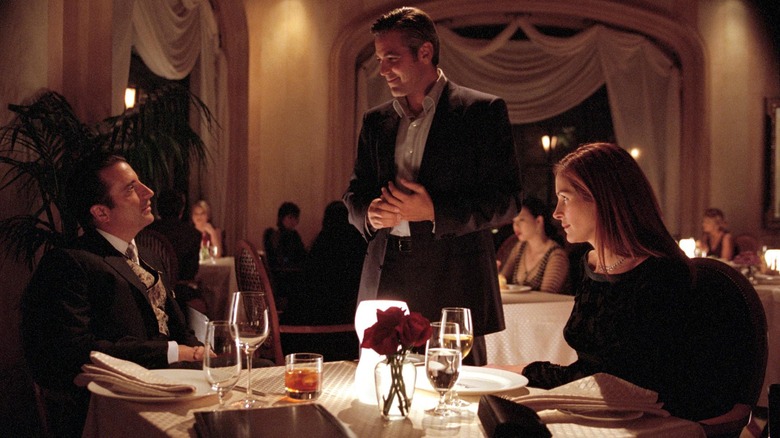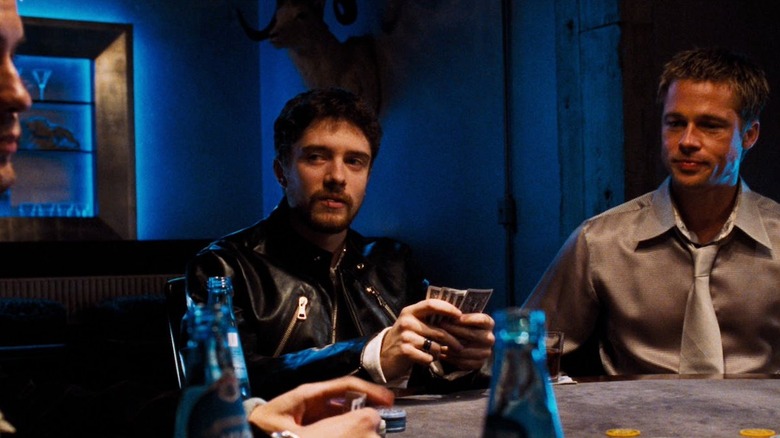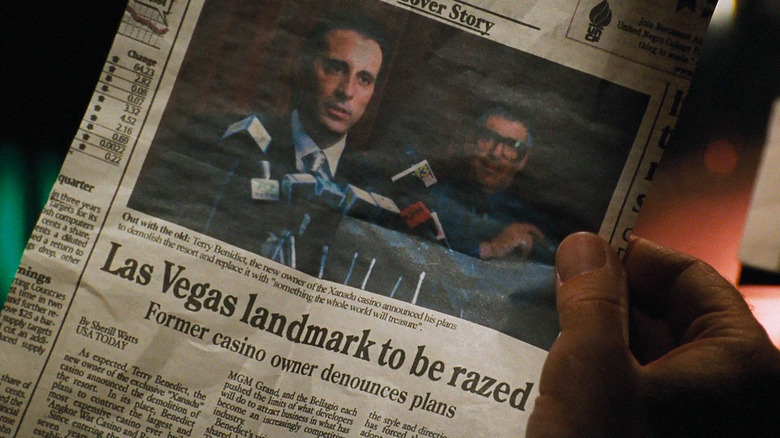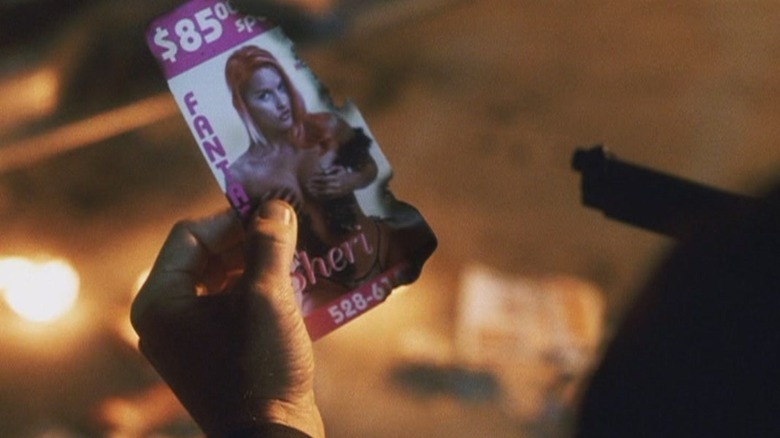Ocean's Eleven Facts That Are Too Good For Danny Ocean To Steal
Modern-day heist movies have a pretty specific grammar to their storytelling style, complete with scenes of sharply-dressed conmen walking around in groups, casing out the joint together, making plans that are shown from multiple points of view, and the heist appearing to fail at the end, only to later reveal that pretending to fail was also part of the conmen's plan.
The reason so many heist movies appear to go through the same story beats is because the majority of them have been directly inspired by 2001's "Ocean's Eleven," filmmaker Steven Soderbergh's stylish reimagining of the 1960 movie of the same name. "Ocean's Eleven" was a huge critical and commercial hit upon its release, and soon became ingrained in pop culture while spawning a whole franchise worth of heist-based films.
Apart from its excellent direction and clever screenplay, "Ocean's Eleven" was also the kind of star-studded feature that you rarely get to see in present times, headlined by Danny Ocean (George Clooney) and Rusty Ryan (Brad Pitt) as the leaders of an elite team of thieves looking to rob a string of Las Vegas casinos. Let us take a look at some facts relating to the making of the film that fans might not be aware of.
Applying real-life physics
Despite featuring some of the biggest Hollywood stars of all time, "Ocean's Eleven" feels like an extremely intimate movie. Most of the scenes are just groups of people talking to each other, and pulling off the heist does not require any huge action set pieces or CGI explosions as would be almost a requirement in modern blockbusters.
The most fanciful stunt that you see Danny and his men pull off during the heist is something called the "pinch." In order to sow confusion at the targeted casino at just the right moment, the conmen arrange to set off an electromagnetic pulse in a different part of the city. The pulse is so strong that it temporarily knocks out the power in several blocks of the city, including the casino.
"A pinch really does exist. It's essentially a particle accelerator and is used to send out an electromagnetic pulse," production designer Phil Messina explained in an interview. "We contacted scientists on the internet and found people who worked with these particle accelerators." Once enough practical information had been gathered, Messina's team set to work designing a fictional version of the pinch based on the most visually interesting parts of the real-world device.
Taking one for the team
"Ocean's Eleven" is one of the most star-studded movies that Hollywood has ever created. In fact, it hardly seems possible that a single movie would count among its main cast George Clooney, Brad Pitt, Matt Damon, Don Cheadle, Andy García, Bernie Mac, and Julia Roberts — most of whom were at the peak of their careers as Hollywood A-listers at the time.
As it turns out, it really was impossible to make a movie with that star cast where every actor would be paid their usual signing fee. In true heist movie fashion, the studio had a trump card up their sleeve: The fact that the movie was going to be directed by Steven Soderbergh, one of the industry's hottest filmmakers at the time that everyone wanted to work with. George Clooney was the first actor Soderbergh pitched the film to in the titular role of Danny Ocean, and things really got rolling when Clooney agreed to take a pay cut to make the film.
"George became the first [cast member] to cut his salary," producer Jerry Weintraub explained in an interview. "Then Steven and George went after our cast." Not only did Clooney reduce his own fee, but he personally reached out to the other lead actors to convince them to take a pay cut so the project could get greenlit. This included sending Julia Roberts, the biggest female movie star in the world at the time, a cheeky note with a $20 bill that read, "We hear you now make 20 a film now."
Always hungry
In the number of times fans have rewatched "Ocean's Eleven" over the years, one thing that has been remarked upon time and again is the fact that Brad Pitt's character Rusty is shown to be eating something in nearly every scene. Whether discussing the upcoming heist or relaxing with his old pal Danny, Rusty always finds the time to chow down in some manner.
This was not just a personal quirk of Pitt's — even though the actor does love to eat onscreen — but rather, the frequent eating was a character trait for Rusty. "Because [Rusty] was always on the run, always on the move, I figured he could never sit down and have a proper meal," the actor told Joe in 2019. "So he always had to grab something on the run."
Pitt's creative choice of Rusty's constant hunger proved a big hit with fans, and in every sequel in the franchise when Rusty shows up, the character can be seen either eating something or talking about wanting to eat something. Honestly, the biggest surprise regarding Rusty at this point is how the guy can be eating all day and stay so fit.
Fear the prankmaster
George Clooney is well known for pulling elaborate pranks on his celebrity friends — a habit that the actor picked up at the height of his fame. With the star-studded cast of "Ocean's Eleven," Clooney found new scope for his pranks, something that his co-stars in the movie learned to be wary of at all times and occasionally participate in.
"At some point, you just go, 'Okay, yeah, my door has shaving cream all over it? Okay,'" Julia Roberts stated in an interview with Vanity Fair. "My phone has Neosporin in the earpiece? Okay 'Hello?' Squish — you just surrender." But while the other actors learned to put up with Clooney's pranks, they caused Brad Pitt to become jumpy and constantly on edge, not knowing when the next prank will fall.
Matt Damon, for example, obtained and accidentally lost Pitt's hotel room key during filming. Rather than get a new key, Pitt was convinced that the loss of the original key was part of an elaborate prank, and disaster awaited him if he ventured into his hotel room. "I get home from the set, it takes me two hours, I rip my room apart like f**kin' Harry Caul, man," Pitt declared. "I check the closet, check the toilet, that it isn't saran wrapped. I pick the phone up to check for vaseline." Damon was so entertained by Pitt's paranoia that he told Clooney, "Don't give [Pitt] the key — this is better than any prank."
What could have been
When you're making a giant ensemble movie filled with the hottest actors, the question isn't simply whether they are willing to work together, but whether they will find the time to fit the project into their schedules. "Ocean's Eleven" ran into such problems a couple of times with the initial cast of actors who were approached.
One such actor was Mark Wahlberg, who was approached to play the role of expert pickpocket Linus Caldwell. Wahlberg ended up passing on the role, and Matt Damon stepped in to pick up the slack. But don't expect Wahlberg to express regret for missing out on all that sweet franchise cash. "It was well worth [passing on the role]!" the actor said bluntly to U.K.'s Zoo Today (via HuffPost). "The second one sucked! People tell George Clooney it's great, but we all know it sucked."
According to The Ringer, another actor who was rumored to be in the running to play Danny Ocean was Bruce Willis. It is difficult to imagine Willis playing the suave and charming Danny with the kind of charisma George Clooney brought to the table, but Willis did go on to become a part of the franchise with a brief cameo in the sequel to "Ocean's Eleven."
The uncredited role
While Danny Ocean is the titular character in "Ocean's Eleven," the movie is an ensemble project in the truest sense of the word. Each member of Danny's team of thieves is essential for pulling off the perfect robbery, and one the most important pieces of the puzzle is Basher Tarr, played by Don Cheadle.
As an electronic surveillance technician, Basher brings the technical expertise Danny's team needs to get in and out of the casino vaults without getting caught on camera. But it seems that there was some difference of opinion behind the scenes regarding just how important a role Basher plays in the movie. In fact, the end credits for "Ocean's Eleven" omit to specify the name of the actor who plays Basher.
This was not a mistake, but something Don Cheadle himself requested. "With Ocean's, there was some stuff that happened behind the scenes that I didn't like how it went down," the actor told Black Star News. "So I just said, 'Take my name off it.'" Whatever the issue was, it did not stop Cheadle from reprising his role as Basher in the sequels, and he did get prominent billing in those movies.
The bad accent
It is often entertaining for American viewers to see British or Australian actors try to play American roles, and struggle with nailing the accent. But the difficulty works both ways. Over the years a few American actors have tried their hand at mimicking British accents with mixed results, as was the case with Don Cheadle in "Ocean's Eleven."
The movie sees Cheadle playing the role of Basher Tarr, a London native who lends a hand during Danny Ocean's Las Vegas heist. Basher has to provide a lot of technical exposition in the movie, and what makes the whole thing really distracting is Cheadle's highly unconvincing Cockney accent in those moments. "I've taken so much s**t for that [accent]," the actor admitted to The Guardian, explaining how his trip to Britain to attend the BAFTAs was beset by annoyed natives criticizing Basher's accent to his face.
Thanks to the internet, though, Cheadle has an excuse for his not-quite-London accent. A popular online theory is that Basher was actually an American, pretending to be British for some secret reason. "Sure! Let's go with that!" Cheadle stated when he heard about the theory on People's Party with Talib Kweli. "I get a little cover with that. Now I can say that, 'He was an American, doing a British accent — you guys missed that?'"
Discovering the acrobat
"Ocean's Eleven" is far from an action movie, but it does feature some pretty breathtaking acrobatic displays thanks to the character of "The Amazing" Yen, a Chinese acrobat who is required to be smuggled inside the casino in a small space so he can work the joint from the inside and take down the security system where the loot is stored.
Since the pool of actors or stuntmen in Hollywood who can pull off the feats of agility displayed by Yen in the movie was very small, the makers had to look outside while casting the role. Enter Qin Shaobo, a professional acrobat and contortionist who was touring the U.S. and performing in Las Vegas when he was spotted by talent scouts. They asked Qin to audition for "Ocean's Eleven," which he agreed to do without knowing much about the big-name actors he would soon be working with.
"I didn't know they were household names in the U.S. and in metropolitan China as well," Qin admitted in an interview. His command of English was so poor at the time that the newbie actor had to use a translator to understand the script and communicate with the other actors. Still, Shaobo's physical prowess was unimpeachable, and he ended up appearing in future "Ocean's" movies, including the all-female reboot.
Not as easy as it seemed
"Ocean's Eleven" is the kind of movie that you imagine must have been a blast to make: A bunch of well-dressed actors, who were good friends in real life, eating the best food and lounging around luxurious casinos while planning their heist over expensive drinks sounds like a vacation for Hollywood A-listers.
As fun as making the movie was for the actors, though, filmmaker Steven Soderbergh had a much harder time bringing the whole thing together. In fact, the veteran filmmaker has gone so far as to declare "Ocean's Eleven" the most difficult project of his career, and it all often came down to the intricate nature of the script and the real-life locations where they had to shoot the whole thing.
"I had days of real agony on Ocean's," Soderbergh explained to the Director's Guild of America. "It was a kind of shooting that I hadn't really attempted before." The filmmaker even admitted that several times he was forced to send the cast and crew away for the day because he could not decide how to shoot a particular scene. Soderbergh goes on to explain that, ironically, the reason the movie-making process was so hard was because he wanted the style of storytelling to "be breezy. I didn't want [the audience] to feel me sweating, even though I was sweating a lot."
Not a fan of the original
The 2001 version of "Ocean's Eleven" is widely considered one of the best Hollywood films of its decade, and a game-changing pathbreaker for the heist genre. But that was not the first time the story of Danny Ocean and his crew of rapscallions had been brought to the big screen by Hollywood A-listers.
In 1960, director Lewis Milestone made "Ocean's 11," a flashy heist movie featuring some of the most celebrated stars of the time including Frank Sinatra, Dean Martin, Sammy Davis Jr., Peter Lawford, and Joey Bishop. The film was viewed with fond memories by fans, thanks mainly due to its coterie of stars. When it was time to remake "Ocean's 11," George Clooney had little doubt about being compared to the original.
"Everybody will say, you know, 'Oh, [the original is] one of my favorite films,'" the actor told LA Times (via Express.co.uk) in 2001. "And I'll always say, 'Have you ever seen it?'" Clooney goes on to argue that the main appeal of the original "Ocean's 11" was its star cast, while the remake's main strength would be its script, explaining, "Nobody touches Frank and Sammy and Dean, and we won't ever be that cool. But we do have a really great story."
A nice crime movie
One thing you notice about "Ocean's Eleven" when comparing it to other films in the genre is just how good-natured it is in its execution. Sure, the main characters are a group of thieves looking to rob a casino, and the owner of the casino is no saint himself, but the unethical side of the business is never the focus of the movie.
In fact, most of "Ocean's Eleven" feels like a road trip dramedy about friendship and brotherhood, and hanging out in swanky locations, and eating and drinking the best of what life has to offer. No wonder "Ocean's Eleven" is like comfort food for so many viewers. This warm and congenial atmosphere was something that director Steven Soderbergh consciously set out to create while making the film.
"When I say 'Ocean's Eleven' is a throwback to an earlier period in cinema, I mean that the movie is never mean," Soderbergh explained to Washington Examiner. "It's never gratuitous, nobody is killed, nobody is humiliated for no reason, or is the butt of a joke." According to the filmmaker, his intention had been to make "a sort of light entertainment and I didn't think darker or meaner ideas had a place in a movie like this. I wanted it to be sparkling."
Lots of cameos
"Ocean's Eleven" is a who's who of Hollywood royalty at the turn of the century. Apart from starring a bevy of A-listers, the bit players and secondary character roles are also filled out by distinguished actors. But the list does not end there, as the movie features a bunch of celebrity cameos for eagle-eyed fans to discover.
The most obvious example is the scene near the beginning when Danny Ocean is shown teaching a bunch of newbies how to play cards. Danny's little study group includes some of the hottest up-and-coming film and TV stars of the era, including Topher Grace, Shane West, and Holly Marie Combs. Henry Silva and Angie Dickinson also make an appearance in the movie, having previously starred in the 1960 version of "Ocean's Eleven."
Even the director of the movie, Steven Soderbergh, and producer Jerry Weintraub get in on the action. While Soderbergh plays one of the thieves that plant a bomb, Weintraub can briefly be seen sitting at the bar in one of the casinos. Famed Vegas entertainers Wayne Newton and Siegfried & Roy also manage to make quick cameos, along with boxers Lennox Lewis and Wladimir Klitschko.
The changed scene
"Ocean's Eleven" is a remarkably feel-good movie considering it is a crime dramedy filled with duplicitous characters all double-crossing each other for money. But while showing all that was acceptable, there was one scene in the movie that was deemed too much to be kept in the original release.
At the time the movie was being made, America was still reeling from the 9/11 terrorist attacks on the World Trade Center. Films and television were taking pains to avoid any mention of the topic. This proved a problem for "Ocean's Eleven," which featured a scene in which a building named "The New York-New York Hotel & Casino" gets demolished in a manner reminiscent of the collapse of the Twin Towers.
According to a report by World Entertainment News Network (via IGN), the makers of the movie realized they had a problem on their hands, and the scene was "deemed inappropriate" in light of the recent tragedy in New York. To get around the issue, the scene was reworked using CGI, and the building's name was changed to The Xanadu instead.
The biggest plot hole
Thanks to its clever twists and turns, "Ocean's Eleven" is considered a brainy movie by the standards of mainstream Hollywood. The story unfolds like a puzzle box, keeping audiences on their toes as they try to keep up with the plan laid out by Danny Ocean's gang to rob a bunch of casinos in a single night.
Each part of the plan is examined from different angles by the film's characters for the benefit of viewers. Even when the plan seems to fall apart in the end, it turns out to be part of Danny's master plan. But there is one part of the heist that left many fans scratching their heads: At one point in the third act, the casino security discovers the money in the bags they secured had been replaced by flyers for an escort service.
The flyers are not a few, but they number in the thousands. So when and how exactly did Danny's crew find the time to stash the flyers inside the casino for the final switcheroo? If you think the makers of the movie might have the answer, you're out of luck. On the film's DVD commentary (via The-Solute), director Steven Soderbergh freely admits that the mysterious appearance of the flyers inside the casino is a plot hole with no suitable explanation.
